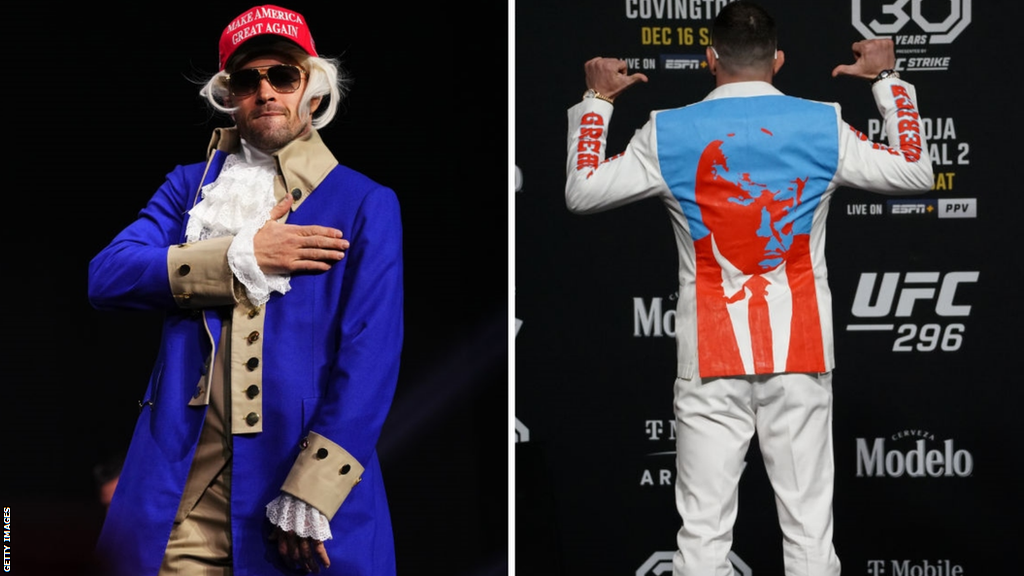UFC 296: 'I turn myself to 11' - why Colby Covington deliberately steers character into the ugly
- Published
Covington jibe about Edwards' late father provokes response
UFC 296: Leon Edwards v Colby Covington | |
|---|---|
Venue: T-Mobile Arena, Las Vegas Date: Saturday, 16 December | |
Coverage: Follow live text coverage of on BBC Sport website & app from 04:00 GMT on Sunday 17 December | |
You perhaps see glimpses of a softer Colby Covington when the cameras are not present.
Before the American sits down for his interview, he politely greets the BBC, giving a friendly fist bump. Later in the day he takes the time to stop and say "see you later buddy" during a chance encounter.
This is the Covington who gave career advice to a fan on YouTube and was subsequently urged to show this more "humble side" of his personality more often.
In the video, Covington replies "thank you, I appreciate it, but that's not what sells".
The Covington that presents to the world and on camera is different, however. As well as being a salesman and promoter, he is the villain.
He plays the agitator and his character often veers into the ugly, crossing lines no-one would usually cross all in the pursuit of generating interest.
A day after this interview took place, Covington marred the pre-fight news conference with a repulsive comment about Edwards' late father, who was murdered in 2004.
"I wouldn't say that I have a persona, I just decided to turn myself up to 11," Covington says.
"I talk the talk and I walk the walk. Who cares what people think about me?"
Dressed in a flamboyant red and white suit with a large Donald Trump mugshot on the back, Covington stands out from the other fighters who are scattered around the UFC Apex building on Wednesday in Las Vegas as they speak to the media.
The suit is signed by the former US president himself and with Covington adding his own autograph, it is worth "probably a few hundred grand".
As the Miami-based Covington introduces himself, he says: "Hello, I'm Colby 'Chaos' Covington. I'm the people's champ, I'm America's champ, I'm the king of Miami but most importantly, I'm Donald Trump's favourite fighter.
"And to all the British fans out there, three things you may not know about me - I love women, I love fast cars and I love to eat good food."
His flamboyant suits and pro-Trump persona might make him stand out, but his remark to Edwards is not the first time Covington has appeared to deliberately turn ugly.
The first occurred in 2017 in a defining moment for his career and the character he would go on to adopt.
'I don't care about being liked'
Before facing Brazilian Demian Maia six years ago, Covington found out he was going to be released from the UFC because they deemed he wasn't entertaining enough for the fans, despite being on a four-fight win streak.
"I tried to be nice and respectful early on in my career but then I realised people didn't care and I wasn't making big pay cheques," recalls Covington.

Colby Covington deliberately courts controversy to generate interest
After beating Maia in Sao Paulo, Covington was loudly booed and subsequently insulted Brazilians in an inflammatory post-fight speech which went viral on social media.
By being controversial and playing the villain, he had found a way of getting people to pay attention to him.
That approach has worked for Covington, who has fought twice for the title since - losing both bouts to Kamaru Usman - but, like with the remark about Edwards' father, he sometimes stoops too low and has been accused multiple times of overstepping the line into discrimination as he attempts to sell his fights.
His comments on Brazilians in 2017 were condemned by a number of UFC fighters, external as being xenophobic, while in 2020, Covington was accused of racism, external following his win over Tyron Woodley.
Covington has always denied his comments were discriminatory and is unapologetic for anything he says.
"Most people want to be liked by everybody, I don't care about being liked," he adds.
"You can hate me but you'll tune in to watch me fight."
'A lot of the psychology I take from the WWE'
UFC 296: Paddy 'the Baddy' Pimblett answers people's real-life dilemmas
The concept of attracting attention to yourself and fights by being the antagonist is common in pro wrestling, and Covington says his personality has been influenced by the WWE in particular.
He walks out to fights accompanied by former WWE champion Kurt Angle's theme music, while the crowd chant "you suck" in unison.
"A lot of the psychology I take from the WWE," says Covington. "I respect the athletes so much, the way they put their bodies on the line and the way they're able to entertain a crowd, because that's what it's all about.
"It's all about the fans of the UFC, the fans of the sport, and giving them an entertaining show, making them forget about whatever's going on in their life and giving them a show.
"Ric Flair, Kurt Angle, Hulk Hogan - those are some of the biggest inspirations in my career."
Covington is wearing large white-trimmed sunglasses which hide his eyes during the interview, making it difficult to read his facial expressions and emotions.
But he adds: "I'm not an emotional person. I literally haven't cried since high school 18 years ago.
"I don't want to get too emotional with the highs because then I'll get too low with the lows.
"My friends and family would describe me as a fearless hard worker who was willing to put it all on the line to chase his dreams - and he never gave up on his dreams, no matter how much adversity he faced. [That] he took the long way.
"I was delayed, but I will not be denied."